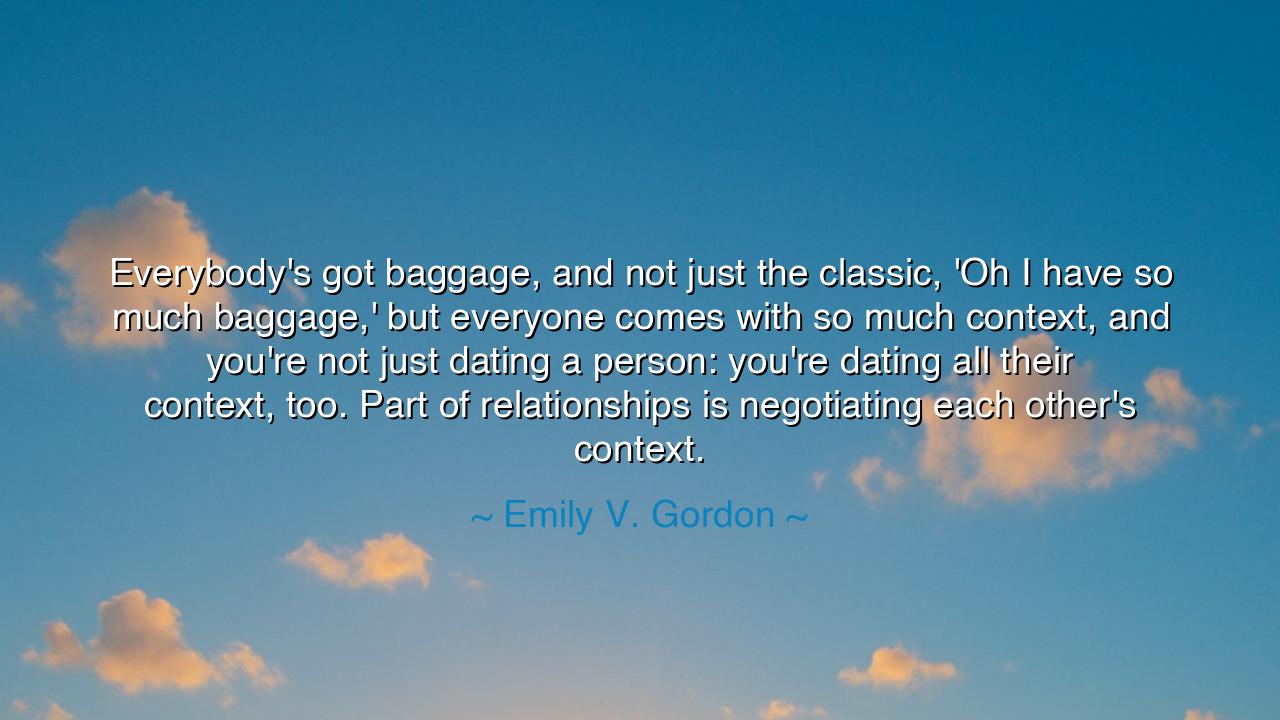
Everybody's got baggage, and not just the classic, 'Oh I have so
Everybody's got baggage, and not just the classic, 'Oh I have so much baggage,' but everyone comes with so much context, and you're not just dating a person: you're dating all their context, too. Part of relationships is negotiating each other's context.






In the wise and compassionate words of Emily V. Gordon, we are reminded of a truth that lies at the heart of all human connection: “Everybody's got baggage, and not just the classic, 'Oh I have so much baggage,' but everyone comes with so much context, and you're not just dating a person: you're dating all their context, too. Part of relationships is negotiating each other's context.” In this reflection, there is no bitterness, only deep understanding. Hers is the voice of one who has looked closely at love—not the love of fantasy or perfection, but the love that exists between flawed, complicated souls. She speaks to the ancient and enduring truth that to love another is to accept not only who they are now, but all that has shaped them.
Emily V. Gordon, a writer and therapist by training, has lived the very wisdom she shares. Known for co-writing The Big Sick, a story drawn from her own romance with comedian Kumail Nanjiani, she has seen how love must stretch to hold both joy and pain. When she speaks of “context,” she reminds us that no person stands alone in the present. We are all the sum of our histories, our traumas, our families, our cultures, and the invisible threads of experience that bind us to our past. To enter into a relationship, then, is to meet not one soul, but a constellation—to learn the language of another’s history, and to offer grace for the scars that history has left behind.
The ancients knew this truth, though they spoke of it in different tongues. The philosopher Plato, in his myth of the soulmates, told that humans were once whole beings, divided by the gods, forever seeking their other half. But what he did not say—what Gordon’s words reveal—is that even when two halves meet, they must still learn to understand each other’s stories. For the halves have wandered separately for lifetimes; each carries the dust of many roads. To unite is not to erase that dust, but to honor it—to see in it the journey that brought the other to your side. Thus, the act of negotiating each other’s context is not a burden, but a sacred labor: the weaving together of two narratives into one living story.
There is an ancient tale from Japan of the red string of fate, invisible but unbreakable, tying two destined souls together. Yet when those two finally meet, the string is often tangled. To love truly is to untangle it with patience—to work through the knots of misunderstanding, fear, and memory. So it is with what Gordon calls “baggage.” We all carry our own—losses, regrets, old wounds that still whisper in the night. But love is not frightened by baggage; it becomes stronger for carrying it together. For when we accept another’s context, we teach them that they are more than their pain—that their story can be rewritten in tenderness.
There is power in this understanding, for it teaches humility. Many enter relationships expecting perfection, only to be disappointed when the illusion breaks. But as Gordon’s words remind us, to love without illusion is to love with wisdom. The context of a person is not something to fix or deny—it is the soil from which their character grows. To love someone fully is to learn the shape of their past, to listen to the echoes that live within them, and to make peace with their imperfections. This is not easy work; it demands empathy, patience, and the willingness to be transformed yourself.
Consider the story of Marcus Aurelius, the philosopher-king. In his Meditations, he spoke often of enduring others’ faults with understanding, saying, “When you wake in the morning, tell yourself: today I will meet people who are meddling, ungrateful, arrogant, deceitful, envious, and unsocial.” Yet he did not mean this with despair. He meant that the wise must love others not despite their humanity, but because of it. What Aurelius called human frailty, Gordon calls context—the complex web that makes each of us who we are. To reject it is to reject humanity itself. To embrace it is to open the door to compassion.
So, my children of the future, take this teaching to heart: love is not the search for the unburdened, but the courage to share in the burden. When you meet another, do not ask for perfection; ask instead, “What stories do you carry?” Learn to hold those stories with gentleness, for one day your own will need the same grace. Relationships are not only about romance—they are the meeting of two worlds. When two people learn to negotiate each other’s context, they build something stronger than desire: they build understanding, and from understanding grows peace.
And remember always, this is not a task completed once, but a lifelong practice. The work of love is the work of patience, listening, and forgiveness. So, do not fear the baggage you or others carry. See it as the evidence of living, of surviving, of becoming. For as Emily V. Gordon reminds us, love is not about finding someone unmarked by life—it is about finding someone willing to walk beside you, through the past, into the present, and toward the future, carrying together the shared weight of what it means to be human.






AAdministratorAdministrator
Welcome, honored guests. Please leave a comment, we will respond soon